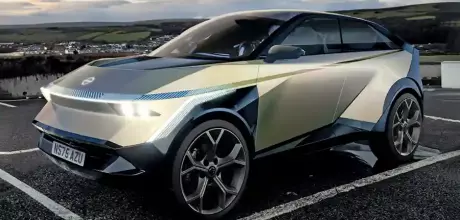All New 2024 NISSAN: Price Parity Ensured for Electric Qashqai and Juke Models
Nissan's commitment to the next generation of electrified vehicles heralds an exciting era for the iconic Qashqai and Juke. Scheduled for launch in the latter half of this decade, these electric-only successors aim to maintain price parity with their current combustion-engine counterparts.
The goal is ambitious yet clear: the upcoming all-new 2024 NISSAN models—designed, engineered, and manufactured in Britain—will cost the same as the existing petrol and hybrid variants. Despite the usual higher cost associated with EVs, Nissan's CEO, Makoto Uchida, expressed a firm dedication to selling these models at a price matching today's ICE cars.
Uchida acknowledged the challenge in achieving this price equivalence, highlighting the need for scalable solutions and established supply chains. «We're striving to balance the cost of EVs with ICE cars,» he remarked, citing varying regulations across countries as a significant factor in this endeavor.
Both the Qashqai and Juke, transitioning to electric power, will continue production in Sunderland alongside the Leaf EV's successor, set to transform from a hatchback to a crossover. Nissan's substantial £1.19 billion investment in its UK operations underscores its commitment to this transformation.
Expect these new models to maintain their distinctive, edgy styling, as showcased by concepts like the Hyper Urban and Hyper Punk at recent auto shows. Emphasizing aerodynamics to optimize efficiency and range, Nissan aims for a seamless transition to the CMF-EV platform shared within the Renault-Nissan-Mitsubishi Alliance.
While sharing a platform, each new NISSAN crossover—Qashqai, Juke, and the Leaf EV—will uphold unique characteristics tailored to their respective markets and customer expectations. This simultaneous development allows Nissan to carefully determine commonalities and differences based on customer values.
The production deal at Sunderland will involve establishing a third battery plant by Nissan's partner company AESC, focusing on nickel-manganese-cobalt (NMC) chemistry batteries. Additionally, Nissan is exploring the potential use of lithium-iron-phosphate (LFP) batteries, considering their affordability for smaller cars, although this might pose challenges in meeting EU and UK regulations.
Looking forward, Nissan remains open to adopting solid-state batteries by 2028, aiming to reduce costs, double energy density, and triple charging speed—an innovation that could shape the future of EVs built at the plant.
Anticipating a full shift to electric cars in Europe by 2030, Nissan acknowledges challenges in navigating varying market transitions across regions. With a strong export focus from Sunderland, the possibility of producing existing ICE models alongside their electric successors remains under consideration, subject to market demands and regulatory landscapes.
The commitment to innovation, market understanding, and customer-centricity underscores Nissan's ongoing success, setting the stage for the arrival of the all-new 2024 NISSAN models.


